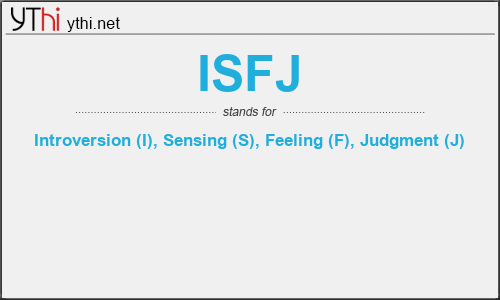What does ISFJ mean? What is the full form of ISFJ?
The Full Form of ISFJ is Introversion (I), Sensing (S), Feeling (F), Judgment (J).
According to Carl G. Jung’s theory of psychological types [Jung, 1971], people can be characterized by their preference of general attitude:
- Extraverted (E) vs. Introverted (I),
their preference of one of the two functions of perception:
- Sensing (S) vs. Intuition (N),
and their preference of one of the two functions of judging:
- Thinking (T) vs. Feeling (F)
The three areas of preferences introduced by Jung are dichotomies (i.e. bipolar dimensions where each pole represents a different preference). Jung also proposed that in a person one of the four functions above is dominant – either a function of perception or a function of judging. Isabel Briggs Myers, a researcher and practitioner of Jung’s theory, proposed to see the judging-perceiving relationship as a fourth dichotomy influencing personality type [Briggs Myers, 1980]:
- Judging (J) vs. Perceiving (P)
The first criterion, Extraversion – Introversion, signifies the source and direction of a person’s energy expression. An extravert’s source and direction of energy expression is mainly in the external world, while an introvert has a source of energy mainly in their own internal world.
The second criterion, Sensing – Intuition, represents the method by which someone perceives information. Sensing means that a person mainly believes information he or she receives directly from the external world. Intuition means that a person believes mainly information he or she receives from the internal or imaginative world.
The third criterion, Thinking – Feeling, represents how a person processes information. Thinking means that a person makes a decision mainly through logic. Feeling means that, as a rule, he or she makes a decision based on emotion, i.e. based on what they feel they should do.
The fourth criterion, Judging – Perceiving, reflects how a person implements the information he or she has processed. Judging means that a person organizes all of his life events and, as a rule, sticks to his plans. Perceiving means that he or she is inclined to improvise and explore alternative options.
All possible permutations of preferences in the 4 dichotomies above yield 16 different combinations, or personality types, representing which of the two poles in each of the four dichotomies dominates in a person, thus defining 16 different personality types. Each personality type can be assigned a 4 letter acronym of the corresponding combination of preferences:
ISFJ
means
Introversion (I), Sensing (S), Feeling (F), Judgment (J)![]()
Translate Introversion (I), Sensing (S), Feeling (F), Judgment (J) to other language.


Leave a Reply
You must be logged in to post a comment.